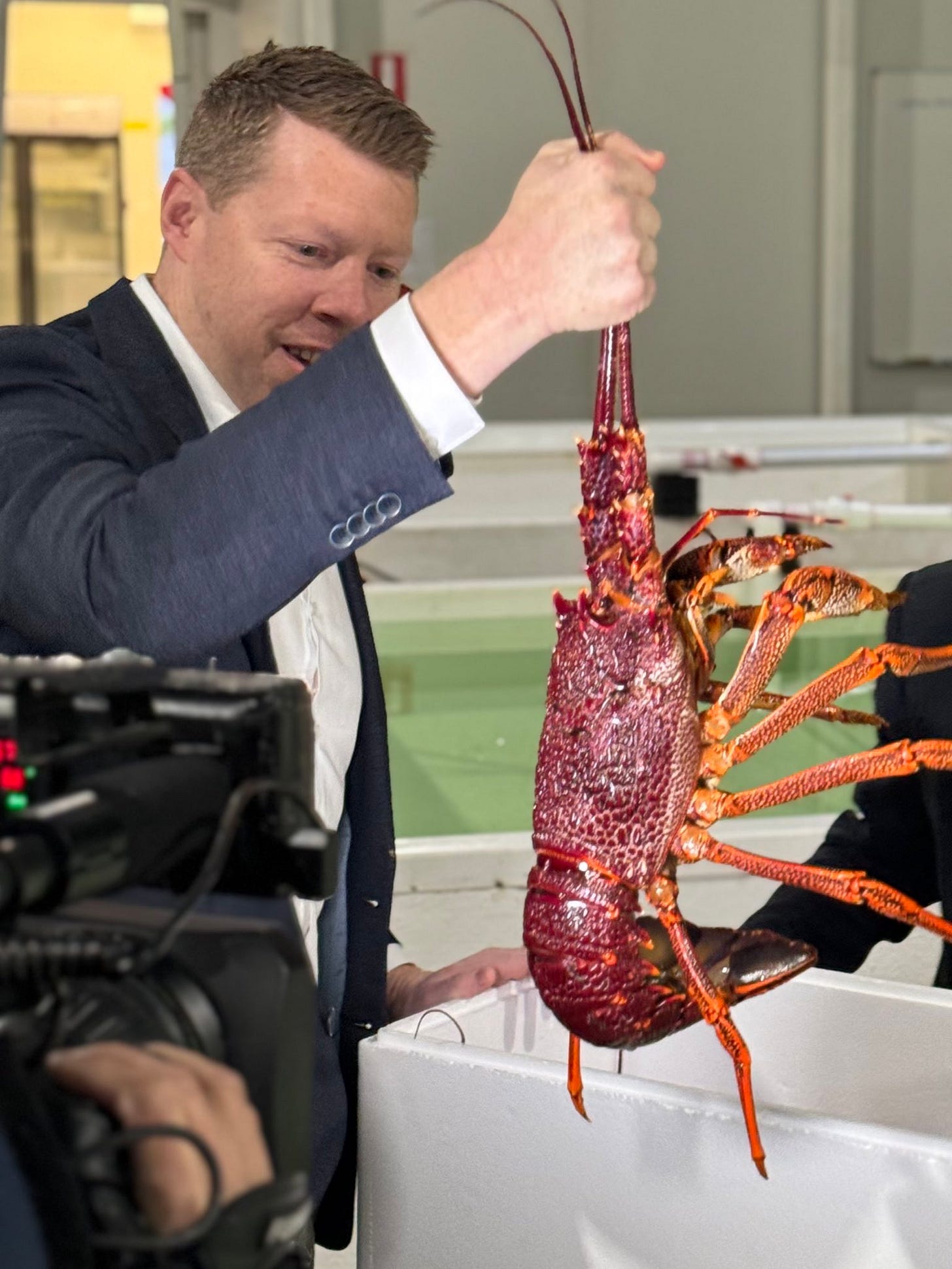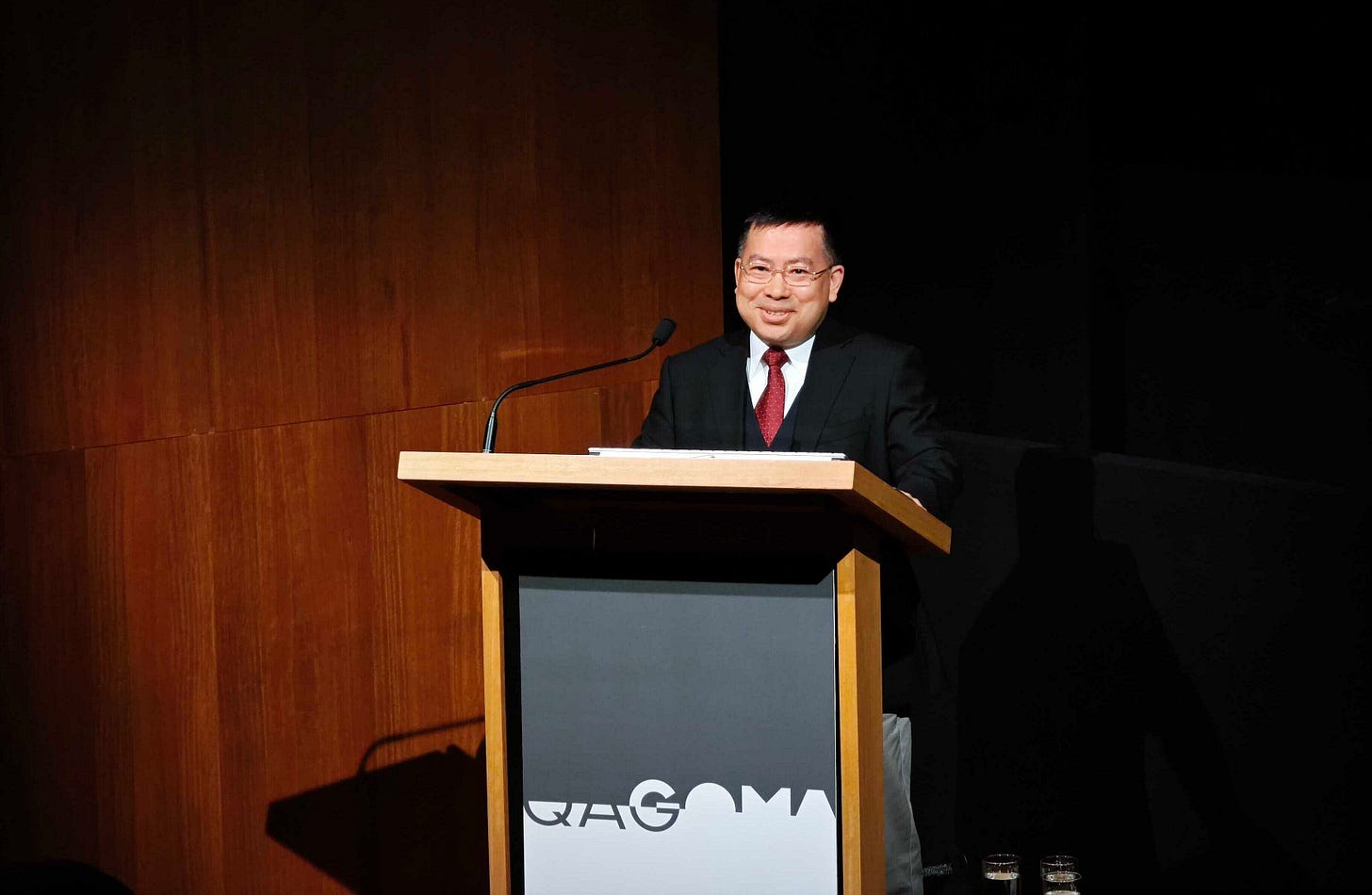Live lobster exports, more one-China disinformation, and anti-Taiwan messages
Weeks of 17-ish June to 7 July 2024
This is the free fortnightly(-ish) BCB newsletter. For readers looking for breaking analysis of major bilateral developments, BCB now also offers a paid subscription add-on. BCB in Brief provides quick assessments of the big events shaping the Australia-China relationship. You can upgrade to a paid subscription here:
Live lobster doubts linger
Prime Minister Anthony Albanese speaking to 7AD Devonport on 21 June:
“[W]e’re very hopeful … that in coming weeks crayfish will open up again to China.”
Quick take:
This is just one among the Albanese government’s many upbeat assessments (here, here, and here) about the prospects for Australian live lobster exports to China following Premier Li Qiang’s mid-June visit. In the wake of this leader-level trip, the South Australian government even announced pre-emptive measures to support lobster exporters re-enter the Chinese market. And yet despite an additional beef establishment gaining access to China in early July, the final trade restrictions on live lobster and two red meat exporters remained stubbornly in place at the time of writing. On 19 June, Prime Minister Albanese was hopeful that the trade restrictions on live lobster would go “in the next couple of weeks.” But more than three weeks later, those trade restrictions persist.
As I wrote last edition, the removal of these final trade restrictions isn’t guaranteed. And it’s certainly possible that the higher-profile restrictions on live lobster will be removed without the last two red meat exporters also regaining access to the Chinese market. Those caveats notwithstanding, it still seems that the trade restrictions on live lobster are likely to be dismantled. There’s no additional slam-dunk evidence that I’ve seen in the last few weeks confirming an imminent removal of these trade restrictions. But industry sources are still optimistic that these trade barriers will be removed based on ongoing discussions between Australia’s Department of Agriculture, Fisheries and Forestry and the General Administration of Customs China. More broadly, I still assess that Beijing has compelling reasons for removing these trade restrictions. Given all the optimism expressed by Prime Minister Albanese and his government, the live lobster restrictions remaining in place would likely become embarrassing for Canberra. It’d quickly emerge as a target for political attacks from the Coalition opposition and would undermine the Albanese government’s efforts to trumpet their handling of the relationship with China.
Given the potentially significant domestic political costs for the Albanese government, maintaining the live lobster restrictions would be an own goal for China. It’d weaken the domestic political position of a government with which Beijing has built a broadly cooperative relationship, and over time it could even erode broader Australian public approval of bilateral relationship stabilisation. Of course, none of this means that China will necessarily remove the trade restrictions on live lobster. But viewed from the perspective of Beijing’s efforts to keep Canberra generally onside with its agenda for a warmer and more collaborative bilateral relationship, keeping trade restrictions on Australian live lobster probably goes against China’s own interests.

Beijing’s one-China policy disinformation
From the Chinese Ministry of Foreign Affairs (MFA) readout of the 17 June meeting between Prime Minister Albanese and Premier Li:
“Albanese noted that … Australia upholds the one-China principle.”
Quick take:
This is the latest in a long and lengthening list of examples of the People’s Republic of China (PRC) misrepresenting Australian government policy on recognition of the government in Beijing (here, here, here, and here). In numerous speeches, statements, articles, and other forms of official messaging, Beijing has incorrectly claimed that Canberra is committed to the one-China principle, according to which, among other things, “Taiwan is an inalienable part of China.” Like numerous other instances, the readout of the leader-level meeting appears designed to muddy the fact that Canberra maintains a one-China policy and has only ever acknowledged without endorsing Beijing’s view that Taiwan is a province of the PRC.
Interestingly, the Chinese-language readout of the same meeting didn’t include this mischaracterisation of Australian policy and instead correctly referred to Australia upholding a one-China policy (“一个中国政策”). Based on that, one might be inclined to charitably interpret the English-language readout as simply a product of human error or a translation glitch. Putting this down to bureaucratic messiness rather than malign intent might seem especially plausible given that some recent examples of Chinese government messaging include side-by-side references to Australia’s adherence to a one-China policy and the one-China principle.
Despite such seemingly confused examples of Chinese government messaging, the regularity of the misrepresentation in recent years makes this charitable interpretation prima facie implausible. Moreover, no capital on Earth, with the possible exception of Taipei, is more attuned than Beijing to the significance of the phraseology of other capital’s positions on the PRC and Taiwan. The notion that the Chinese government would sincerely confuse one-China policies and its preferred principle is hard to believe. So, rather than innocent error, the above is more likely a deliberate effort to spread disinformation about Canberra being committed to Beijing’s one-China principle. As Beijing has done in relation to past international communiqués, UN General Assembly Resolution 2758, and other countries’ policy positions, the Chinese government appears determined to continue falsely claiming that Canberra is committed to the view that Taiwan is a province of the PRC.

Chinese diplomats amplify anti-Taiwan messages
Ruan Zongze, China’s Consul-General in Brisbane, speaking (here and here) at the Griffith Asia Institute on 20 June:
“The one-China principle is the political foundation and prerequisite for China to grow its diplomatic ties with 183 countries across the world.”
Quick take:
The MFA readout of the June leader-level meeting is certainly not the only recent example of Beijing spreading the falsehood that Australia supports the PRC’s one-China principle. In addition to Consul-General Ruan’s recent speech in which he recycled a series of deceptive claims about the international community’s commitment to the one-China principle, other Chinese diplomats in Australia have also been busy spreading disinformation and propagating the PRC’s position on Taiwan. In a series of interviews, symposia, speeches, and engagements (here, here, here, and here), Chinese diplomats in Melbourne, Adelaide, and Brisbane have been making misleading claims about international adherence to the one-China principle and rallying support for Beijing’s view that Taiwan is an inalienable part of the PRC.
Most of these seem to have been relatively small-scale events and won’t necessarily shape Australian government policy. Yet they still offer an indication of how China might be trying to shape Australia’s approach to ties with Taiwan and the PRC. With Beijing often brandishing its one-China principle as a reason for other capitals to not engage with Taipei, it’s possible that PRC efforts to dissemble are designed to delegitimise and incrementally roll back extensive Australian political, cultural, scientific, people-to-people, and federal and state government contact with Taiwan. Because such bilateral connectivity is perfectly consistent with Australia’s one-China policy, Beijing might be seeking to propagate the erroneous idea that Canberra is committed to the PRC’s one-China principle and that broad-based engagement with Taiwan is therefore verboten. It’s noteworthy in that regard that the Chinese Consul-General in Melbourne in one recent interview seemed to express hope that not just Australia’s federal government, but other levels of government and broader Australian society would abide by the one-China principle.
What does all this mean for Australia? As I’ve argued previously (here, here, and here), there’s a case for the Australian government to clearly call out Beijing’s disinformation about Canberra being committed to the one-China principle. In doing so, Canberra should also assert Australia’s latitude to engage with Taiwan as part of its one-China policy. There was a conspicuous and, so far as I can see, unprecedented (at least in recent times) example of this earlier this year. On 17 May, the Australian Department of Foreign Affairs and Trade (DFAT) directly pushed back against the Chinese Embassy’s mischaracterisation of Australian policy and asserted that “Australia adheres consistently to our longstanding and bipartisan One China policy.” Although this is welcome, Canberra might need to issue these kinds of explicit disavowals more often to combat Beijing’s louder and more regular disinformation. It might also be necessary for these corrections to be elevated from DFAT statements to ministerial-level messages.
Regardless of one’s position on the wisdom (or lack thereof) of these kinds of responses from Canberra, one thing seems increasingly clear. Beijing is more actively spreading disinformation about Australia’s one-China policy and seems intent on convincing Australians that their government is committed to the PRC’s view that Taiwan is one of its provinces. This suggests that PRC pressure on Australia to wind back engagement with Taiwan might also grow. And as a result, the broad and longstanding ties between Australia and Taiwan seem likely to emerge as a more acute point of bilateral tension between Canberra and Beijing. Despite recent Australia-China relationship stabilisation, disagreements endure and deepen.
As always, thank you for reading, and please excuse any errors (typographical or otherwise). Any and all objections, criticisms, and corrections are very much appreciated.




“Although this is welcome, Canberra might need to issue these kinds of explicit disavowals more often to combat Beijing’s louder and more regular disinformation.“
Agreed. All western governments would do well to heed this advice on a whole range of infractions by Beijing.
"Given the potentially significant domestic political costs for the Albanese government, maintaining the live lobster restrictions would be an own goal for China".
Bless you for thinking so, but China can read Hansard and the polls as well as you and I.
No, Australia is China's enemy and has always been and is now preparing to launch a nuclear attack on the Mainland.
Why would Beijing care what we thought?